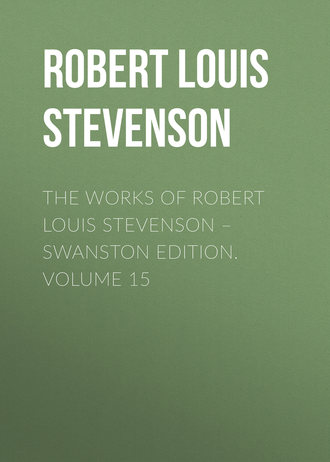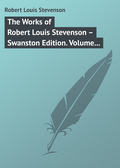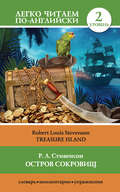
Роберт Льюис Стивенсон
The Works of Robert Louis Stevenson – Swanston Edition. Volume 15
Goriot. I shan’t, and what’s more I wun’t. (Charles and Ernestine lead him up stage, protesting. All rise except Notary.)
Dumont (front R., shaking hands with Macaire). Sir, you have a noble nature. (Macaire picks his pocket.) Dear, me, dear me, and you are rich.
Macaire. I own, sir, I deceived you: I feared some wounding offer, and my pride replied. But to be quite frank with you, you behold me here, the Baron Henri-Frédéric de Latour de Main de la Tonnerre de Brest, and between my simple manhood and the infinite, these rags are all.
Dumont. Dear me, and with this noble pride, my gratitude is useless. For I, too, have delicacy. I understand you could not stoop to take a gift.
Macaire. A gift? a small one? never!
Dumont. And I will never wound you by the offer.

Goriot (taking the stage). But, look ’ee here, he can’t marry.

Goriot. Not without his veyther’s consent! And he hasn’t got it; and what’s more, he can’t get it: and what’s more, he hasn’t got a veyther to get it from. It’s the law of France.
Aline. Then the law of France ought to be ashamed of itself.
Ernestine. O, couldn’t we ask the Notary again?
Curate. Indubitably you may ask him.

Notary. Constracting parties.
Curate. Possibly to-morrow at an early hour he may be more perspicuous.
Goriot. Ay, before he’ve time to get at it.
Notary. Unoffending jurisconsult overtaken by sorrow. Possibly by applying justice of peace might afford relief.

Goriot. I’ll go. I don’t mind getting advice, but I wun’t take it.
Macaire. My friends, one word: I perceive by your downcast looks that you have not recognised the true nature of your responsibility as citizens of time. What is care? impiety. Joy? the whole duty of man. Here is an opportunity of duty it were sinful to forego. With a word, I could lighten your hearts; but I prefer to quicken your heels, and send you forth on your ingenuous errand with happy faces and smiling thoughts, the physicians of your own recovery. Fiddlers, to your catgut! Up, Bertrand, and show them how one foots it in society; forward, girls, and choose me every one the lad she loves; Dumont, benign old man, lead forth our blushing Curate; and you, O bride, embrace the uniform of your beloved, and help us dance in your wedding-day. (Dance, in the course of which Macaire picks Dumont’s pocket of his keys, selects the key of the cash-box, and returns the others to his pocket. In the end, all dance out; the wedding-party, headed by Fiddlers, L.C.; the Maids and Aline into the inn, R.U.E. Manet, Bertrand and Macaire.)
SCENE VIII
Macaire, Bertrand, who instantly takes a bottle from the wedding-table, and sits with it, L
Macaire. Bertrand, there’s a devil of a want of a father here.
Bertrand. Ay, if we only knew where to find him.
Macaire. Bertrand, look at me: I am Macaire; I am that father.
Bertrand. You, Macaire? – you a father?
Macaire. Not yet, but in five minutes. I am capable of anything. (Producing key.) What think you of this?
Bertrand. That? Is it a key?
Macaire. Ay, boy, and what besides? my diploma of respectability, my patent of fatherhood. I prigged it – in the ardour of the dance I prigged it; I change it beyond recognition, thus (twists the handle of the key); and now…? Where is my long-lost child? produce my young policeman, show me my gallant boy.
Bertrand. I don’t understand.
Macaire. Dear innocence, how should you? Your brains are in your fists. Go and keep watch. (He goes into the office and returns with the cash-box.) Keep watch, I say.
Bertrand. Where?
Macaire. Everywhere. (He opens box.)
Bertrand. Gold.
Macaire. Hands off! Keep watch. (Bertrand at back of stage.) Beat slower, my paternal heart! The third compartment! let me see.
Bertrand. S’st! (Macaire shuts box.) No: false alarm.
Macaire. The third compartment. Ay, here t —
Bertrand. S’st! (Same business.) No: fire away.
Macaire. The third compartment: it must be this.
Bertrand. S’st. (Macaire keeps box open, watching Bertrand.) All serene: it’s the wind.
Macaire. Now, see here! (He darts his knife into the stage.) I will either be backed as a man should be, or from this minute out I’ll work alone. Do you understand? I said alone.
Bertrand. For the Lord’s sake, Macaire! —
Macaire. Ay, here it is. (Reading letter.) “Preserve this letter secretly; its terms are known only to you and me; hence when the time comes, I shall repeat them, and my son will recognise his father.” Signed: “Your Unknown Benefactor.” (He hums it over twice and replaces it. Then, fingering the gold.) Gold! The yellow enchantress, happiness ready-made and laughing in my face! Gold: what is gold? The world; the term of ills; the empery of all; the multitudinous babble of the ’Change, the sailing from all ports of freighted argosies; music, wine, a palace; the doors of the bright theatre, the key of consciences, and – love’s – love’s whistle! All this below my itching fingers; and to set this by, turn a deaf ear upon the siren present, and condescend once more, naked, into the ring with fortune – Macaire, how few would do it! But you, Macaire, you are compacted of more subtile clay. No cheap immediate pilfering: no retail trade of petty larceny; but swoop at the heart of the position, and clutch all!
Bertrand (at his shoulder). Halves!
Macaire. Halves? (He locks the box.) Bertrand, I am a father. (Replaces box in office.)
Bertrand (looking after him). Well, I – am – damned!
DROP
ACT II
When the curtain rises, the night has come. A hanging cluster of lighted lamps over each table, R. and L. Macaire, R., smoking a cigarette; Bertrand, L., with a churchwarden: each with bottle and glass
SCENE I
Macaire, Bertrand
Macaire. Bertrand, I am content: a child might play with me. Does your pipe draw well?
Bertrand. Like a factory chimney. This is my notion of life: liquor, a chair, a table to put my feet on, a fine clean pipe, and no police.
Macaire. Bertrand, do you see these changing exhalations do you see these blue rings and spirals, weaving their dance, like a round of fairies, on the footless air?
Bertrand. I see ’em right enough.
Macaire. Man of little vision, expound me these meteors! What do they signify, O wooden-head? Clod, of what do they consist?
Bertrand. Damned bad tobacco.
Macaire. I will give you a little course of science. Everything, Bertrand (much as it may surprise you), has three states: a vapour, a liquid, a solid. These are fortune in the vapour: these are ideas. What are ideas? the protoplasm of wealth. To your head – which, by the way, is solid, Bertrand – what are they but foul air? To mine, to my prehensile and constructive intellects, see, as I grasp and work them, to what lineaments of the future they transform themselves: a palace, a barouche, a pair of luminous footmen, plate, wine, respect, and to be honest!
Bertrand. But what’s the sense in honesty?
Macaire. The sense? You see me: Macaire: elegant, immoral, invincible in cunning; well, Bertrand, much as it may surprise you, I am simply damned by my dishonesty.
Bertrand. No!
Macaire. The honest man, Bertrand, that’s God’s noblest work. He carries the bag, my boy. Would you have me define honesty? the strategic point for theft. Bertrand, if I’d three hundred a year, I’d be honest to-morrow.
Bertrand. Ah! don’t you wish you may get it!
Macaire. Bertrand, I will bet you my head against your own – the longest odds I can imagine – that with honesty for my spring-board, I leap through history like a paper hoop, and come out among posterity heroic and immortal.
SCENE II
To these, all the former characters, less the Notary. The fiddles are heard without playing dolefully. Air: “O dear, what can the matter be?” in time to which the procession enters
Macaire. Well, friends, what cheer?

Curate. The facts have justified the worst anticipations of our absent friend, the Notary.
Macaire. I perceive I must reveal myself.
Dumont. God bless me, no!
Macaire. My friends, I had meant to preserve a strict incognito, for I was ashamed (I own it!) of this poor accoutrement; but when I see a face that I can render happy, say, my old Dumont, should I hesitate to work the change? Hear me, then, and you (to the others) prepare a smiling countenance. (Repeating.) “Preserve this letter secretly; its terms are known only to you and me: hence when the time comes, I shall repeat them, and my son will recognise his father. – Your Unknown Benefactor.”
Dumont. The words! the letter! Charles, alas! it is your father!
Charles. Good Lord! (General consternation.)
Bertrand (aside; smiting his brow). I see it now; sublime!
Curate. A highly singular eventuality.
Goriot. Him? O well, then, I wun’t. (Goes up.)
Macaire. Charles, to my arms! (Business.) Ernestine, your second father waits to welcome you. (Business.) Goriot, noble old man, I grasp your hand. (He doesn’t.) And you, Dumont, how shall your unknown benefactor thank you for your kindness to his boy? (A dead pause.) Charles, to my arms!
Charles. My father, you are still something of a stranger. I hope – er – in the course of time – I hope that may be somewhat mended. But I confess that I have so long regarded Mr. Dumont —
Macaire. Love him still, dear boy, love him still. I have not returned to be a burden on your heart, nor much, comparatively, on your pocket. A place by the fire, dear boy, a crust for my friend, Bertrand. (A dead pause.) Ah, well, this is a different home-coming from that I fancied when I left the letter: I dreamed to grow rich. Charles, you remind me of your sainted mother.
Charles. I trust, sir, you do not think yourself less welcome for your poverty.
Macaire. Nay, nay – more welcome, more welcome. O, I know your – (business) backs! Besides, my poverty is noble. Political… Dumont, what are your politics?
Dumont. A plain old republican, my lord.
Macaire. And yours, my good Goriot?
Goriot. I be a royalist, I be, and so be my daater.
Macaire. How strange is the coincidence! The party that I sought to found combined the peculiarities of both; a patriotic enterprise in which I fell. This humble fellow … have I introduced him? You behold in us the embodiment of aristocracy and democracy. Bertrand, shake hands with my family. (Bertrand is rebuffed by one and the other in dead silence.)
Bertrand. Sold again!
Macaire. Charles, to my arms! (Business.)
Ernestine. Well, but now that he has a father of some kind, cannot the marriage go on?
Macaire. Angel, this very night: I burn to take my grandchild on my knees.
Goriot. Be you that young man’s veyther?
Macaire. Ay, and what a father!
Goriot. Then all I’ve got to say is, I shan’t and I wun’t.
Macaire. Ah, friends, friends, what a satisfaction it is, what a sight is virtue! I came among you in this poor attire to test you; how nobly have you borne the test! But my disguise begins to irk me: who will lend me a good suit? (Business.)
SCENE III
To these, the Marquis, L.C
Marquis. Is this the house of John Paul Dumont, once of Lyons?
Dumont. It is, sir, and I am he, at your disposal.
Marquis. I am the Marquis Villers-Cotterets de la Cherté de Médoc. (Sensation.)
Marcaire. Marquis, delighted, I am sure.
Marquis (to Dumont). I come, as you perceive, unfollowed; my errand, therefore, is discreet. I come (producing notes from breast-pocket) equipped with thirty thousand francs; my errand, therefore, must be generous. Can you not guess?
Dumont. Not I, my lord.
Marquis (repeating). “Preserve this letter,” etc.
Marcaire. Bitten!
Bertrand. Sold again! (Aside.) (A pause.)
Aline. Well, I never did!
Dumont. Two fathers!
Marquis. Two? Impossible.
Dumont. Not at all. This is the other.
Marquis. This man?
Marcaire. This is the man, my lord; here stands the father. Charles, to my arms! (Charles backs.)
Dumont. He knew the letter.
Marquis. Well, so did I.
Curate. The judgment of Solomon.
Goriot. What did I tell ’ee? he can’t marry.
Ernestine. Couldn’t they both consent?
Marquis. But he’s my living image.
Marcaire. Mine, Marquis, mine.
Marquis. My figure, I think?
Marcaire. Ah, Charles, Charles!
Curate. We used to think his physiognomy resembled Dumont’s.
Dumont. Come to look at him, he’s really like Goriot.
Ernestine. O papa, I hope he’s not my brother.
Goriot. What be talking of? I tell ’ee, he’s like our Curate.
Charles. Gentlemen, my head aches.
Marquis. I have it: the involuntary voice of nature, at me, my son.
Macaire. Nay, Charles, but look at me.
Charles. Gentlemen, I am unconscious of the smallest natural inclination for either.
Marquis. Another thought: what was his mother’s name?
Macaire. What was the name of his mother by you?
Marquis. Sir, you are silenced.
Macaire. Silenced by honour. I had rather lose my boy than compromise his sainted mother.
Marquis. A thought; twins might explain it: had you not two foundlings?
Dumont. Nay, sir, one only; and, judging by the miseries of this evening, I should say, thank God!
Macaire. My friends, leave me alone with the Marquis. It is only a father that can understand a father’s heart. Bertrand, follow the members of my family. (They troop out, L.U.E. and R.U.E., the fiddlers playing. Air: “O dear, what can the matter be?”)
SCENE IV
Macaire, Marquis
Marquis. Well, sir?
Macaire. My lord, I feel for you. (Business. They sit, R.)
Marquis. And now, sir?
Macaire. The bond that joins us is remarkable and touching.
Marquis. Well, sir?
Macaire (touching him on the breast). You have there thirty thousand francs.
Marquis. Well, sir?
Macaire. I was but thinking of the inequalities of life, my lord: that I, who, for all you know, may be the father of your son, should have nothing; and that you, who, for all I know, may be the father of mine, should be literally bulging with bank notes… Where do you keep them at night?
Marquis. Under my pillow. I think it rather ingenious.
Macaire. Admirably so. I applaud the device.
Marquis. Well, sir?
Macaire. Do you snuff, my lord?
Marquis. No, sir, I do not.
Macaire. My lord, I am a poor man.
Marquis. Well, sir? and what of that?
Macaire. The affections, my lord, are priceless. Money will not buy them; or, at least, it takes a great deal.
Marquis. Sir, your sentiments do you honour.
Macaire. My lord, you are rich.
Marquis. Well, sir?
Macaire. Now follow me, I beseech you. Here am I, my lord; and there, if I may so express myself, are you. Each has a father’s heart, and there we are equal; each claims yon interesting lad, and there again we are on a par. But, my lord – and here we come to the inequality, and what I consider the unfairness of the thing – you have thirty thousand francs, and I, my lord, have not a rap. You mark me! not a rap, my lord! My lord, put yourself in my position; consider what must be my feelings, my desires; and – hey?
Marquis. I fail to grasp…
Macaire (with irritation). My dear man, there is the door of the house; here am I; there (touching Marquis on the breast) are thirty thousand francs. Well, now?
Marquis. I give you my word of honour, sir, I gather nothing; my mind is quite unused to such prolonged exertion. If the boy be yours, he is not mine; if he be mine, he is not yours; and if he is neither of ours, or both of ours … in short, my mind…
Macaire. My lord, will you lay those thirty thousand francs upon the table?
Marquis. I fail to grasp … but if it will in any way oblige you… (Does so.)
Marcaire. Now, my lord, follow me: I take them up; you see? I put them in my pocket; you follow me? This is my hat; here is my stick; and here is my – my friend’s bundle.
Marquis. But that is my cloak.
Marcaire. Precisely. Now, my lord, one more effort of your lordship’s mind. If I were to go out of that door, with the full intention – follow me close – the full intention of never being heard of more, what would you do?
Marquis. I! – send for the police.
Marcaire. Take your money! (Dashing down the notes.) Man, if I met you in a lane! (He drops his head upon the table.)
Marquis. The poor soul is insane. The other man, whom I suppose to be his keeper, is very much to blame.
Marcaire (raising his head). I have a light! (To Marquis.) With invincible oafishness, my lord, I cannot struggle. I pass you by; I leave you gaping by the wayside; I blush to have a share in the progeny of such an owl. Off, off, and send the tapster!
Marquis. Poor fellow! (Exit.)
SCENE V
Marcaire, to whom Bertrand. Afterwards Dumont
Bertrand. Well?
Marcaire. Bitten!
Bertrand. Sold again!
Marcaire. Had he the wit of a lucifer-match! But what can gods or men against stupidity? Still, I have a trick. Where is that damned old man?
Dumont (entering). I hear you want me.
Marcaire. Ah, my good old Dumont, this is very sad.
Dumont. Dear me, what is wrong?
Marcaire. Dumont, you had a dowry for my son?
Dumont. I had; I have: ten thousand francs.
Marcaire. It’s a poor thing, but it must do. Dumont, I bury my old hopes, my old paternal tenderness.
Dumont. What? is he not your son?
Marcaire. Pardon me, my friend. The Marquis claims my boy. I will not seek to deny that he attempted to corrupt me, or that I spurned his gold. It was thirty thousand.
Dumont. Noble soul!
Marcaire. One has a heart… He spoke, Dumont, that proud noble spoke, of the advantages to our beloved Charles; and in my father’s heart a voice arose, louder than thunder. Dumont, was I unselfish? The voice said no; the voice, Dumont, up and told me to begone.
Dumont. To begone? to go?
Marcaire. To begone, Dumont, and to go. Both, Dumont. To leave my son to marry, and be rich and happy as the son of another; to creep forth myself, old, penniless, broken-hearted, exposed to the inclemencies of heaven and the rebuffs of the police.
Dumont. This is what I had looked for at your hands. Noble, noble man!
Marcaire. One has a heart … and yet, Dumont, it can hardly have escaped your penetration that if I were to shift from this hostelry without a farthing and leave my offspring to wallow – literally – among millions, I should play the part of little better than an ass.
Dumont. But I had thought … I had fancied…
Marcaire. No, Dumont, you had not; do not seek to impose upon my simplicity. What you did think was this, Dumont: for the sake of this noble father, for the sake of this son whom he denies for his own interest РI mean, for his interest Рno, I mean, for his own Рwell, anyway, in order to keep up the general atmosphere of sacrifice and nobility, I must hand over this dowry to the Baron Henri-Fr̩d̩ric de Latour de Main de la Tonnerre de Brest.

Dumont. Now Charles is rich he needs it not. For whom could it more fittingly be set aside than for his noble father? I will give it you at once.
Bertrand. At once, at once!
Macaire (aside to Bertrand). Hang on. (Aloud.) Charles, Charles, my lost boy! (He falls weeping at L. table. Dumont enters the office and brings down cash-box to table R. He feels in all his pockets: Bertrand from behind him making signs to Macaire, which the latter does not see.)
Dumont. That’s strange. I can’t find the key. It’s a patent key.
Bertrand (behind Dumont, making signs to Macaire). The key, he can’t find the key.
Macaire. O, yes, I remember. I heard it drop. (Drops key.) And here it is before my eyes.
Dumont. That? That’s yours. I saw it drop.
Macaire. I give you my word of honour I heard it fall five minutes back.
Dumont. But I saw it.
Macaire. Impossible. It must be yours.
Dumont. It is like mine, indeed. How came it in your pocket?
Macaire. Bitten! (Aside.)
Bertrand. Sold again! (Aside) … You forget, Baron, it’s the key of my valise; I gave it you to keep in consequence of the hole in my pocket.
Macaire. True, true; and that explains.
Dumont. O, that explains. Now, all we have to do is to find mine. It’s a patent key. You heard it drop.
Macaire. Distinctly.
Bertrand. So I did: distinctly.
Dumont. Here, Aline, Babette, Goriot, Curate, Charles, everybody, come here and look for my key!
SCENE VI
To these, with candles, all the former characters, except Fiddlers, Peasants, and Notary. They hunt for the key
Dumont. It’s bound to be here. We all heard it drop.
Marquis (with Bertrand’s bundle). Is this it?
All (with fury). No.
Bertrand. Hands off, that’s my luggage. (Hunt resumed.)
Dumont. I heard it drop, as plain as ever I heard anything.
Marquis. By the way (all start up), what are we looking for?
All (with fury). O!!
Dumont. Will you have the kindness to find my key? (Hunt resumed.)
Curate. What description of a key —
Dumont. A patent, patent, patent, patent key!
Macaire. I have it. Here it is!
All (with relief). Ah!!
Dumont. That? What do you mean? That’s yours.
Macaire. Pardon me.
Dumont. It is.
Macaire. It isn’t.
Dumont. I tell you it is: look at that twisted handle.
Macaire. It can’t be mine, and so it must be yours.
Dumont. It is NOT. Feel in your pockets. (To the others.) Will you have the kindness to find my patent key?
All. O!! (Hunt resumed.)
Macaire. Ah, well, you’re right. (He slips key into Dumont’s pocket.) An idea: suppose you felt in your pocket?
All (rising). Yes! Suppose you did!
Dumont. I will not feel in my pockets. How could it be there? It’s a patent key. This is more than any man can bear. First, Charles is one man’s son, and then he’s another’s, and then he’s nobody’s, and be damned to him! And then there’s my key lost; and then there’s your key! What is your key? Where is your key? Where isn’t it? And why is it like mine, only mine’s a patent? The long and short of it is this: that I’m going to bed, and that you’re all going to bed, and that I refuse to hear another word upon the subject or upon any subject. There!

(Aline and Maids extinguish hanging lamps over tables, R. and L. Stage lighted only by guests’ candles.)
Charles. But, sir, I cannot decently retire to rest till I embrace my honoured parent. Which is it to be?
Macaire. Charles, to my —
Dumont. Embrace neither of them; embrace nobody; there has been too much of this sickening folly. To bed!!! (Exit violently R.U.E. All the characters troop slowly upstairs, talking in dumb show. Bertrand and Macaire remain in front C., watching them go.)
Bertrand. Sold again, captain?
Macaire. Ay, they will have it.
Bertrand. It? What?
Macaire. The worst, Bertrand. What is man? – a beast of prey. An hour ago, and I’d have taken a crust and gone in peace. But no: they would trick and juggle, curse them: they would wriggle and cheat! Well, I accept the challenge: war to the knife.
Bertrand. Murder?
Macaire. What is murder? A legal term for a man dying. Call it Fate, and that’s philosophy; call me Providence, and you talk religion. Die? Why, that is what man is made for; we are full of mortal parts; we are all as good as dead already, we hang so close upon the brink: touch a button, and the strongest falls in dissolution. Now, see how easy: I take you – (grappling him).
Bertrand. Macaire – O no!
Macaire. Fool! Would I harm a fly, when I had nothing to gain? As the butcher with the sheep, I kill to live; and where is the difference between man and mutton? pride and a tailor’s bill. Murder? I know who made that name – a man crouching from the knife! Selfishness made it – the aggregated egotism called society; but I meet that with a selfishness as great. Has he money? Have I none – great powers, none? Well, then, I fatten and manure my life with his.
Bertrand. You frighten me. Who is it?
Macaire. Mark well. (The Marquis opens the door of Number Thirteen, and the rest, clustering round, bid him good-night. As they begin to disperse along the gallery he enters and shuts the door.) Out, out, brief candle! That man is doomed.







